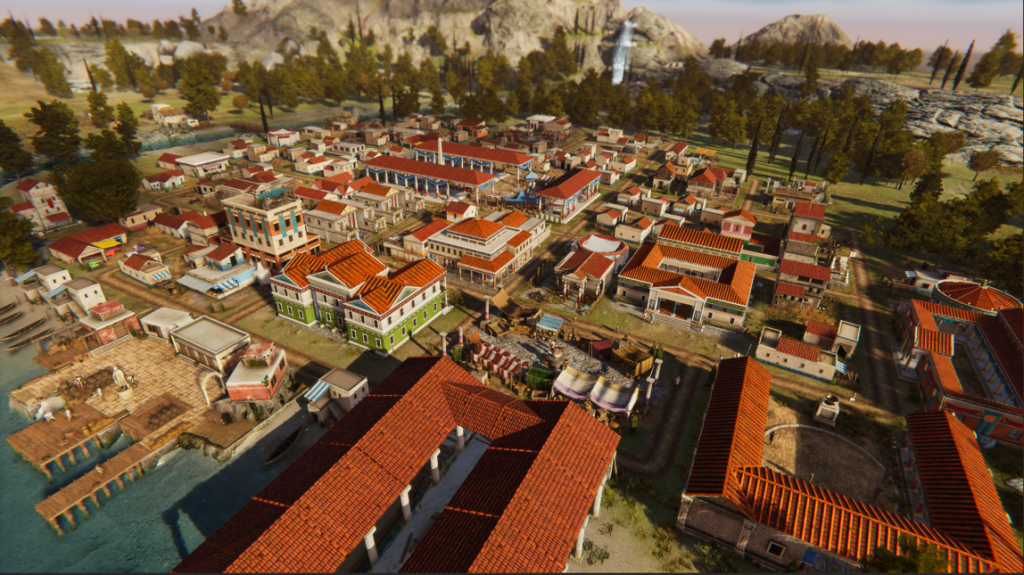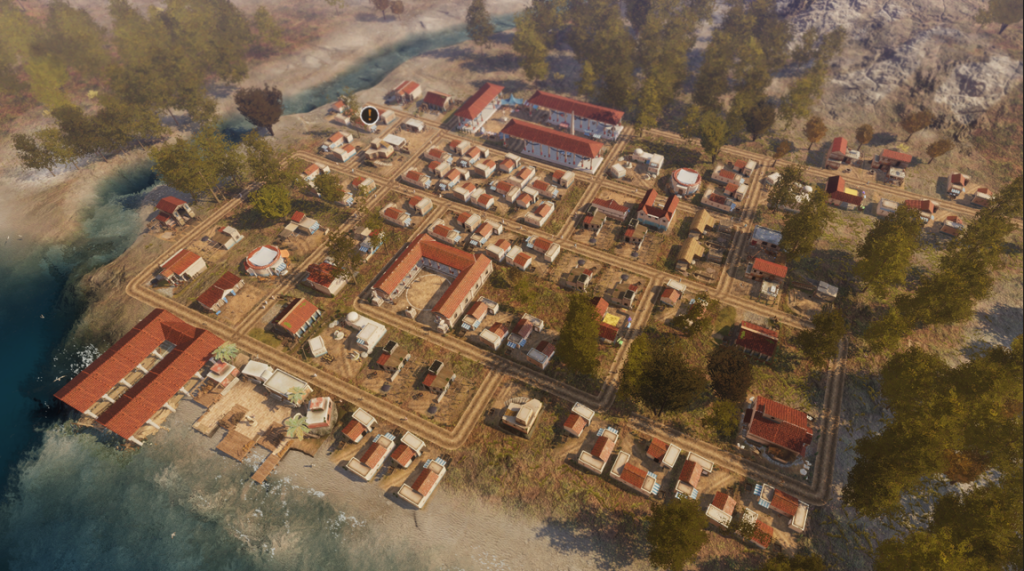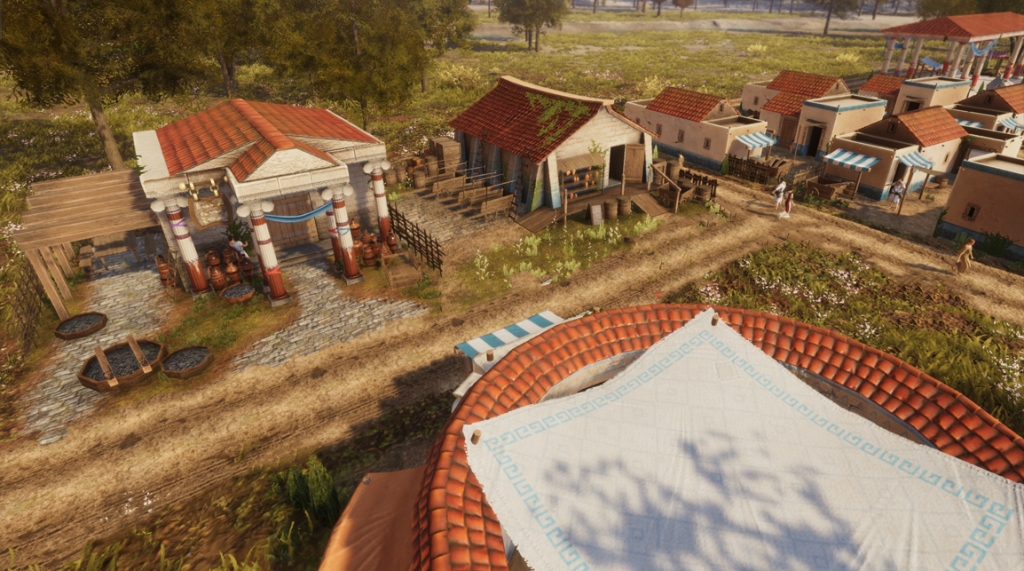Stepping into Builders of Greece is like opening a window to the golden age of the Hellenic city states. As someone who has always been fascinated by ancient history and city management games, I was eager to see how this title balances historical authenticity, strategic depth, and modern gameplay sensibilities.

Authenticity and Atmosphere
From the very first moments, Builders of Greece impresses with its visual charm. The stylized graphics, crisp models, and detailed environments evoke the sun drenched landscapes of the Mediterranean. The architecture strikes a pleasing balance between historical accuracy and romanticized Greek aesthetics, making every session feel like a stroll through a living painting of antiquity. The game’s environments are creating a sense of place that is both immersive and inviting.
This attention to detail extends to the buildings themselves. Players can erect a wide variety of historically inspired structures temples, agorae, workshops, barracks, and more. Each building is not just a visual treat but also serves a distinct purpose in the city’s intricate web of production and social life. The interconnectedness of these structures such as mills relying on grain, or lampmakers needing olive oil demands thoughtful planning and rewards strategic foresight.
City Management and Economic Systems
At the heart of Builders of Greece lies its city management and economic simulation. The game challenges you to design efficient city layouts, manage production chains, and balance resource distribution while keeping citizen satisfaction high. There are multiple citizen classes, each with unique needs and roles: starting with the Thētes (lower class), progressing to Zeugitai, and eventually reaching the elite Geomori. Upgrading citizens is a nuanced process, requiring not just better housing but also amenities like Lesche (resting places) and access to luxury goods such as wine.
Resource management is both accessible and layered. The UI allows you to track up to 12 resources at a time, from basics like food and wood to more advanced goods as your city evolves. Taxes can be adjusted for each citizen class, offering granular control over your city’s finances. The technology tree is straightforward, forcing you to pace your city’s advancement and research one technology at a time, which helps prevent overwhelming micromanagement.
However, the logistics system, while promising, still feels rough around the edges. For example, buildings require proximity to warehouses and marketplaces to function efficiently, but the game doesn’t always provide clear feedback on production bottlenecks or consumption patterns. This can make troubleshooting supply issues more frustrating than it should be, especially for newcomers to the genre.

Strategic Depth and Random Events
One of the game’s standout features is its dynamic world. As ruler, you’re not just building for prosperity you’re also responding to unpredictable events. Natural disasters, plagues, political unrest, and economic shifts keep you on your toes, forcing you to adapt your strategies on the fly. Diplomacy and trade play significant roles; you can establish trade routes, negotiate with neighboring city states, and decide whether to pursue peace or military dominance. Each neighbor has a unique attitude toward your city, and your decisions can turn them into allies or adversaries.
The decree system and economy panel introduced in the full release add further depth, allowing for quick overviews of your city’s status and more responsive management. The inclusion of multiple gods Demeter, Hephaestus, Hades, Ares adds a layer of religious and cultural management, as building temples and organizing festivals can yield tangible in game benefits.
Combat and Military Mechanics
If there’s one area where Builders of Greece stumbles, it’s in its combat system. While the game includes basic military features barracks, unit recruitment, and the threat of raids the mechanics are currently underdeveloped and lack sophistication. Moving units is unintuitive, and battles often feel disconnected from the broader city building experience. The absence of advanced tactics or meaningful defensive structures makes combat feel more like an afterthought than a core pillar of gameplay. As someone who appreciates a well integrated military system, this was a notable disappointment and is an area I hope the developers will improve in future updates.
User Experience and Accessibility
The game’s interface is serviceable but far from polished. Tutorials are minimal, tooltips are scarce, and the learning curve can be steeper than necessary for new players. The grid based placement system for buildings and roads, while functional, sometimes clashes with the organic layouts I associate with historical Greek cities. Road building, in particular, feels clunky roads do not automatically navigate around existing structures, which disrupts the flow of city planning and can be frustrating during large scale expansions.
Despite these issues, the core mechanics are solid. Managing different citizen classes and ensuring their satisfaction provides a satisfying loop of challenge and reward. The sense of progression as your city evolves from a humble settlement to a thriving polis is tangible and engaging.

Modes and Replayability
Builders of Greece offers both a narrative driven campaign mode and a sandbox mode. The campaign introduces the setting and core mechanics through a tutorial, while sandbox mode allows for unrestricted experimentation and city building. Random events and weather conditions add unpredictability, enhancing replayability and ensuring that no two playthroughs are exactly alike. However, as of now, map variety is limited, which may impact long term engagement for some players.
Personal Reflections and Final Thoughts
As a long time enthusiast of city management games and ancient history, Builders of Greece delivers a compelling, if imperfect, experience. The game excels in atmosphere, citizen management, and economic simulation, offering a satisfying challenge for those who enjoy strategic planning and resource optimization. The attention to historical detail and the vibrant depiction of ancient Greece are highlights that kept me engaged for hours.
However, the game’s shortcomings particularly in combat mechanics, user interface, and road building dampen the overall experience. The lack of intuitive tutorials and tooltips can make the early hours unnecessarily confusing, and the primitive combat system fails to match the depth found in other aspects of city management.
In summary, Builders of Greece is a nice entry level city management game, especially for fans of ancient history. Its easy to grasp mechanics and charming visuals make it accessible, while the depth of citizen management and economic systems provide plenty of room for strategic experimentation. If you’re looking for sophisticated combat or a highly polished interface, you may find the current version lacking. But if you’re drawn to the challenge of building a thriving polis and navigating the unpredictable tides of ancient Greek life, this game is well worth your time and I look forward to seeing how it evolves as the developers continue to refine and expand its features